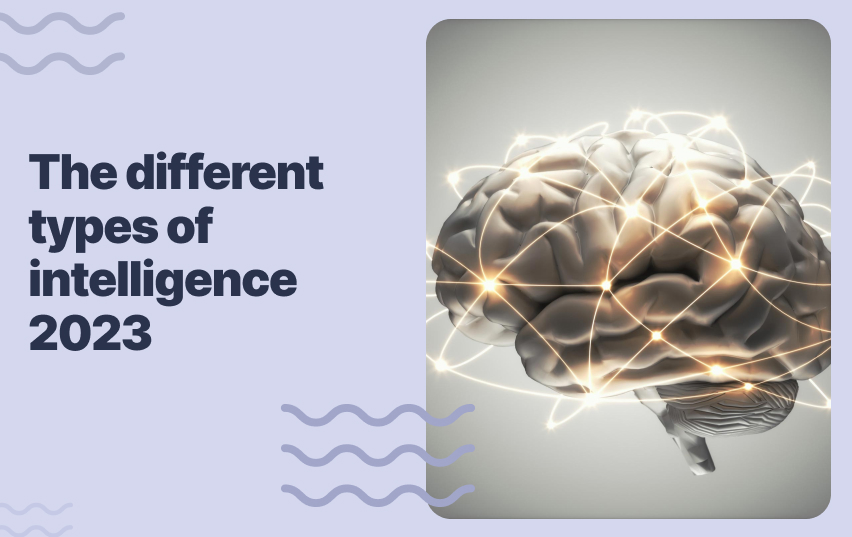
There are different types of intelligence,e and some are more well-known than others. But you should know your intelligence to increase your natural strength and focus on the field you need to work on to improve, which can lead you to success.
So, do you know what type of intelligence you have?
What is the type of my intelligence?
When you hear the word intelligence, the first things that come to mind are math, science, IQ tests, or difficult algorithms. People with high intelligence are appreciated more and placed at higher levels than others. But how can we define intelligence? If you are not good at math but very good at learning different languages, does this mean you are not smart? And does this mean you just need a different structure for studying?
Types of intelligence in Psychology
Howard Gardner, the Harvard psychologist, believes that people do not have a fixed mental capacity, which means each person has a different kind of intelligence; for example, a person might have intelligent music but not very good with numbers. Also, Gardner believes you can’t calculate people’s intelligence by considering only one or two factors. Gardner describes a different kind of intelligence as below:
1. Naturalistic intelligence
Some people are talented in making progress in any field. It is like they have magical skills. Some people can communicate with animals very well, while others perform better by staying at home. Naturalistic intelligence defines people who enjoy communication with nature. They like visiting outside and exploring the outdoors. These people pay attention to the most delicate changes in their environment.
2. Musical intelligence
Some people are interested in music. It is in their nature. People with musical intelligence focus primarily on sounds, and they can recognize noises that others can’t even realize. They understand rhythm so well that, in many cases, they don’t even play an instrument or were never involved in music professionally, but they just get it.
3. Logical-mathematical intelligence
This type of intelligence is the one that most of us do recognize as the general type of intelligence. People with Logical-mathematical intelligence are very good at math and numbers. They understand the algorithms very well, and by this talent, they can get themselves out of trouble easier than others. These types of people are primarily interested in strategic games and solving puzzles.
4. Existential intelligence
People with Existential intelligence think about random daily events. They usually ask questions like: why is the ultimate purpose of life, and why are we here? They are more interested in philosophical conversations and are talented at finding answers to questions beyond them. This intelligence is also called spiritual or moral intelligence.
5. Interpersonal intelligence
Some people can get along with others very well. It is in their nature. These people behave well in different social situations and can read people easier than others. If you also have these characteristics, then you have interpersonal intelligence. These people can understand verbal and non-verbal signs and recognize different moods and sensations. Usually, leaders, social workers, psychologists, or life coaches have this intelligence.
6. Linguistic intelligence
This type of intelligence is shared between humans. This ability of humans helps them to think in words and use the words to make communication with others and receive a mutual understanding. People with linguistic intelligence can turn their feelings into words easier than others. This group is more interested in reading, writing, and public speaking.
7. Bodily–kinaesthetic intelligence
People with this type of intelligence have an excellent understanding of timing and perfect mind and body analogies. They can use their body to transfer their feelings, which is why they usually participate in dance classes, sports fields, and medicine. They can use their body as problem solver tools and create something significant.
8. Spatial intelligence
This ability is considered for people who can measure things in 3 dimensions. These people are very innovative and usually have vivid imaginations, excellent artistic skills, and tremendous spatial argument skills. These people are active in occupations like architecture, design, and map reading.
To Sum it Up
A good understanding of the different types of intelligence provides a broader understanding of intelligence, suggesting that there is an array of potential and capacity for growth that we as a society have not fully explored. Besides, isn’t it nice to know that even if you are entirely useless at maths, it doesn’t necessarily mean that you aren’t smart!
When you have enough knowledge and information about different kinds of intelligence, it will guide you to understand intelligence comprehensively. This means there are many opportunities for people to grow, and society might need to expose those opportunities fully. Also, it feels nice to know that if you are not good at math, it doesn’t mean you are not smart or can’t be good at anything else.
